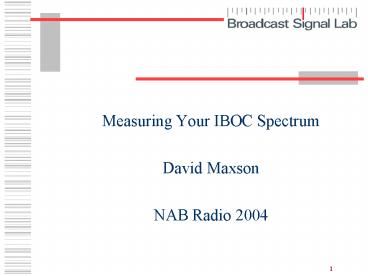Measuring Your IBOC Spectrum - PowerPoint PPT Presentation
1 / 46
Title:
Measuring Your IBOC Spectrum
Description:
Truly 'Hybrid' of analog and digital. Measurement issues will be addressed ... Figure 3: iBiquity FM Hybrid Mode Noise and Spurious Emission Limits ... – PowerPoint PPT presentation
Number of Views:228
Avg rating:3.0/5.0
Title: Measuring Your IBOC Spectrum
1
- Measuring Your IBOC Spectrum
- David Maxson
- NAB Radio 2004
2
Topics
- Measuring Power of Digital Waveforms
- IBOC RF Mask
- Digital Intermodulation and Interference
3
First Thought
- IBOC is amazing
- Truly Hybrid of analog and digital
- Measurement issues will be addressed
- Signals measured differently
- Signals close in frequency
- Interference issues are minor
- No FCC standards yet
- Working IBOC Mask
4
Discussing Power
- FM analog carrier is the reference
- dBc is common term
- Helpful to differentiate dBc references for FM
and for digital - Using dBcFM for analog FM reference
- Using dBcPM for IBOC Primary Main OFDM carrier
power (stipulate bandwidth!)
5
Discussing Power
6
Discussing Power
7
Discussing Power
300 kHz Slice
8
Discussing Power
- FM Power Reference Summary
- Use unmodulated carrier and narrow bandwidth for
most certain result - Alternatively, measure full bandwidth while
modulated - Be certain noise not a factor and no foreign
energy in bandwidth of analyzer - Watch your levels
9
Discussing Power
10
Discussing Power
- IBOC Primary Main subcarriers
- Total digital power 20 dB down
- (from FM analog)
- One side 23 dB down
- Power in 1 kHz bandwidth 41 dB down
- System design specification
- Balances analog compatibility with digital
performance
11
Discussing Power
- IBOC Primary Main subcarriers
- Linear amplification
- Push transmitter into compression
- For more efficiency
- Reduces hardware cost per watt
- With compression comes intermodulation
- Spectral regrowth
12
Precorrection
- Whats the Opposite of Compand?
- Compress-Expand Compand
- Expand-Compress Express????
- Precorrection is Expansion
- Anticipates the compression of the Power Amp
13
Precorrection
- Compression Example
- A digital exciter without precorrection,
measured 6-7 dB peak to average power ratio - After going through the PA, peak to average 4-5
dB
14
Discussing Power
15
Discussing Power
Upper and Lower PM Intermodulation at 328 kHz
Intervals
Center
-492 (2A B)
-164 (A)
164 (B)
492 (2B A)
16
Discussing Power
Intermodulation at 328 kHz Intervals
4th Adjacent
Center
-164
-820
820
164
-492
492
2 ½ th Adjacent
17
Discussing Power
Primary Main IBOC at 164 kHz Regrowth at 492
kHz At 820 kHz
Disclaimer Transmitter with pre-correction
disabled
OFDM Carriers in same group interact with each
other
18
Discussing Power
What Should this Ratio Be?
19
iBiquity RF Mask
-40 dBcFM/kHz
-74.4 dBcFM/kHz
-80 dBcFM/kHz
20
iBiquity RF Mask
-34 dBPM/kHz
21
iBiquity RF Mask
-40 dBPM/kHz
Disclaimer This Proposed Mask is based on what
is practicable, not necessarily on interference
protection analysis
600 kHz
22
Why Regrowth Matters
Field Measurement with 4th Adjacent Signals
23
Whats Wrong with this Picture?
24
Measurements
- Vector Signal Analyzer
- Theoretically ideal
- Complex
- Cost-prohibitive
25
Measurements
- Spectrum analyzer
- Isolates spectra
- Sampling issues
- Dynamic range issues
26
Measurements
- Power Meter
- Precise
- Doesnt differentiate signal components
27
Measurements
- Spectrum Analyzer
- Variations among detectors
- The noise-like waveform problem
- Level understated by 2dB
28
Measurements
- Spectrum Analyzer
- Variations among detection modes
- Sample
- Random sample in each bin
- Average of series of random samples (by
averaging n sweeps) - Max-Min
- Average Max and Min values in successive sweeps
- Video filtering
- Peak
29
Measurements
- Spectrum analyzers
Peak Hold Peak Average Max-Min Average
30
Measurements
- Spectrum analyzers
Any sampling mode shows relation between PM and
regrowth
31
Measurements
- Case Study
- KUVO, Denver
- Nautel V-10 Transmitter
- Adaptive Precorrection
32
KUVO Nautel Flow
Digitized Primary Main Carriers
Digital to RF Conversion
Power Amplification
- Pre-correction
Digital Summing
Adaptation
RF to Digital Conversion
Digitized Analog FM Carrier
Comparator
Adaptive Pre-correction Loop
33
Measurements
- KUVO
- FM only
34
Measurements
- Channel Power
- Analyzerutility
- Computes power ina bandwidth
35
Measurements
- Positive Peaks
- Averaged
- Sample
- Averaged
36
Measurements
- 10 Hz Video Band Width (yellow)
- 40x sample average (green)
37
Adaptive Precorrection
38
Common Amplification
- Common Amplification
- Analog Signal Amplified with Digital
- More Points of Regrowth
39
Common Amplification
Intermodulation at 328 kHz Intervals
Center
-164
-820
820
164
-492
492
40
How to Do It
- Where to sample?
- If digital-only is accessible, check it out
- Helps verify analyzer settings before dealing
with extra analog power - May be only way with separate antennas
41
How to Do It
- Where to sample?
- If signals are combined before antenna, sample
there - Watch out for other signal ingress
- Combiner systems, local signals
- Could overload analyzer
42
How to Do It
- Where to sample?
- Off-air sampling is most challenging
- May be only way to see full hybrid signal
43
How to Do It
- Analyzer setting
- Must have good intermodulation specs
- 100-dB on-screen range helpful
- Read The Manual!
- Total power into analyzer must be safely below
analyzer compression - Minimum measured signal must be above instrument
noise floor
44
How to Do It
- Analyzer setting
- Channel Power computation feature
- Most desirable
- Sample detection mode and multi-sweep averaging
- Good (15 sweeps OK, 50 pretty)
- Max-Min (a.k.a. Pos-Neg) trace averaging
- Less precise
- Very narrow Video Bandwidth
- In the ballpark, but slow and less precise.
45
Acknowledgements
Mike Pappas and The KVOD Crew
Mike Woods, Chris Mahaney
46
Thank You www.broadcastsignallab.com































